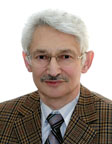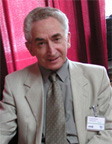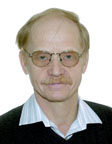Information Technologies in Education
Basic Divisions: Department of Information Technology, Applied Mathematics and Computer Science.
Brief Description of Research Activities
The trend is aimed at the development of scientific and methodological support for solving the problems of informatisation, as well as the increase of efficiency and quality of secondary and professional education.
The specific requirements for the Information and Communication Technology competence level of students, teaching and administrative personnel have been formulated, as well as the unified diagnostic requirements for the invariant, concerning the specialty, Information and Communication Technology competence of pedagogical students and school teachers, and the main diagnostic requirements, related to the specialty. The content, forms and technologies of educationalist advanced Information and Communication Technology training have been explored, as well as the prospects of Information and Communication Technology use in learning of the fundamental discipline cycles.
The specialists within the trend have formulated the principles of formation of the highly developed information and education environment of Innovative University and the information and analytical system for its support.
Another acute scientific problem is computer modelling which has been explored in the following ways: investigation of the potential of Computer Mathematic Modelling in the professional training of Computer Science and Mathematics teachers; analysis of the structure of the educational field “Computer Science” to identify the functions of the “Computer Modelling” course within the field; identification of the structural elements the discipline consists of; development of the course content, formulating of the appropriate skills and competences; development of methods of teaching to perform the analysis of the object including its mathematical modelling and further computer experiment.
The researchers have developed the principles of content formation, teaching methodology and education and methodic support of the comprehensive course “Computer Science” for secondary schools. The principles of Computer Science teaching at secondary school both on the elementary and advanced levels have been developed, as well as the principles of correlation between the programmes of advanced school courses of Computer Science and university Information Technology specialist training courses; the principles of teacher training in the field of theory and methods of Computer Science teaching.
The specialists have also developed scientific and pedagogical principles and the model of the integrated regional information and education environment which includes, on the one hand, the perspective of integration into Russian and international education space, and on the other hand – providing a wide range of specific ways of realisation in practice. In addition to that, the principles of development of the information support system for the Perm Region general education by means of both traditional methods and modern technologies. There have also been forms and content developed for educationalist training and retraining programmes aimed at solving the problems of informatisation in the region.
Selected Publications Characterising Scientific Research Trend
1. Khenner Е.К., Shestakov А.P. The «Mathematical Modeling» Course for Russian Schools: its Purpose, Methods and Content. In «Teaching & Learning Mathematical Modelling». Albion Publishing Chichester, 1997. (In English)
2. Khenner Е.К., Knyazev A.A. Information and Computer Technologies in the Russian School. In “Opening Windows to Change – a case study of sustained international development”. Oxford Studies in Comparative Education. Edited by John Sayer. Symposium Books, 2002. (In English)
3. Khenner E.K., Shestakov A.P. Information and Communication Technology competence of a teacher: structure, requirements and assessment. Computer Science and education, №12. 2004. pp. 5-9. (In Russian)
4. Semakin I.G. Competence, Education, Culture. Journal “Information Studies and Education”, Iss. 1, 2002, pp. 21-24. (In Russian)
5. Semakin I.G. From the education purposes to the content of the school course of Computer Science. Journal “Information Studies and Education”, Iss. 2, 2002. pp. 27-31. (In Russian)
6. Henner E.K. Structure building and formalisation of the requirements for computer literacy and Information and Communication Technology competence of the subjects in the continuing education system. IT implementation in education and science. №2, 2009. pp. 71-85.(In Russian)
7. Rusakov S.V., Semakin I.G., Henner E.K. Analysis of the structure of Information Technology specialists training in Russian universities. Education issues. Issue 3, 2010, pp. 135-151. (In Russian)
8. Khenner E.K. Students and teachers’ Information and Communication Competence development in the system of continuing education. Scientific edition. Moscow. Binomial. The Laboratory of Knowledge. 2008. 188 p. (In Russian)
9. Semakin I.G., Henner E.K. Specialised education at school as a stage of Information Technology specialist training. Specialised education at school as a stage of Information Technology specialist training. IT implementation in education and science. № 1, 2011. pp. 3-14. (In Russian)
The Most Significant Research Projects carried out in the framework of Scientific Research Trend
The Federal Target Programme «Scientific and Teaching Staff of Innovative Russia». Development of educational environment model and intelligence information support system in the innovation university. 2009-2011.
The Analytic Departmental Target Programme of the Russian Federal Education Agency «Development of Higher Education Scientific Potential» “Development of models, methods and technologies of information resources formation and use for university Information Technology specialist training”. 2009-2011.
The Federal State Institution State Research Institute of Information Technologies and Telecommunications «Informica» (Moscow). “Development of scientific and technique support of the branch programme for computer literacy and Information and Communication Technology competence monitoring and certification”. 2008.
The Analytic Departmental Target Programme of the Russian Federal Education Agency «Development of Higher Education Scientific Potential». “Development of conception and technology of the classical university Information Technology education system in highly-developed educational environment”. 2008.
Development of the Regional Target Program «Electronic Prikamye» (2008-2010). Ordered by the Perm Krai Government. 2007.
Training of Researchers
Post-graduate Programme, specialty 13.00.02. “Theory and Methods of Computer Science Teaching”.
International Research and Educational Activities
British-Russian project “Bridge”, participants – Perm State University, Reading University (Great Britain). 2008-2011.
The Project of UNESCO Institute of Information Technologies in Education. “Professional development of teachers in the sphere of Information and Communication Technology”.
Participation in the organisation of the seminars for the educationalists of Azerbaijan (Baku – 2003) and Armenia (Yerevan – 2004).






